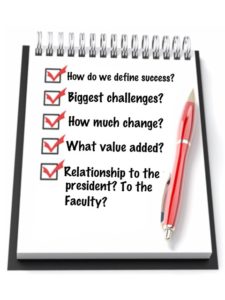
Five Questions for the Dean Search Committee
At many schools, the new academic year will begin with an interim Dean at the helm of the academic administration office. That's not a stretch for a guess as most deans in theological schools have a 4.3 to 4.5 year tenure. In most cases the interim deans will have come out from among the faculty---these are well-meaning, generous people willing to step up to the need of the moment. Most will likely not have previously served as dean, but will do a good enough job keeping the academic enterprise of the school going smoothly to some extent or another. They are to be thanked, for they'll give up a lot during their interim, and take on a responsibility that is critical to the institution; challenging, often thankless, and at times, overwhelming.
Meanwhile, another group will step up to a different task: searching for the next dean. Before coming up with a list of questions to ask the candidates, the search committee will do well to answer the following questions for themselves:
1. How do we define success?
Getting clear about what success means in your context and offering that vision to prospective deans is more fruitful than asking the question of them (e.g., "What is your vision of success for our school?" The honest answer to which is, "I can't know that yet."). What constitutes success is contextual to your school. The answer lies in the culture, shared values, academic intent, and the aspirations of your particular school. Some indicators of success are measurable, while others are aspirational. The one will keep you grounded, foster accountability, and inform strategies; the other will pull you forward---especially during difficult times. The clearer you as a search committee are about these, the more helpful in discerning your best choice among candidates.
2. What are the biggest challenges we face?
While a search committee will put on a good face for a prospective dean and share all the good things about the school, a dean needs to know what challenges she or he will face coming to the position. To the extent the committee has done due diligence in identifying those challenges, has avoided self-referencing ("We're a great school because we believe we are."), and can be transparent and honest, will be the extent a prospective dean can discern whether or not there's a good "fit."
That "fit," however, goes beyond personal likability, transactional familiarity, or cultural affinity. The best "fit" for a dean goes more to function than to role. All deans play the same role (they all have the same job description). Function, however, goes to the needs the school has at a particular point in its trajectory and within its contexts. A school in the midst of an institutional transition requires different functions of its dean than a school entering a period of development. A school requiring significant strategic re-organization needs a different dean than does a school in the midst of a crisis.
No mature or experienced dean will be naive enough to think the job will be smooth, easy, or challenge-free. But deans need to know what the school requires of them that may not appear in the job opening announcement. The "right" dean will be the one who can help the school address its challenges.
3. In what areas must our new Dean create change and development; and how much change can we stand?
Helping a school address its challenges will mean bringing about some level of change. A worthwhile conversation with a prospective dean will be about how well the school handles change and responds to challenges. If a school has change-fatigue from recent developments or transitions, it's not likely it will respond to an energetic, enthusiastic dean who sees herself as a "change agent," or to the impatient dean who "wants everything done by yesterday."
Deans will of necessity bring about change in the institution---it's the nature of the job. How much change a school can stand is a product of capacity and willingness. Let the dean know where you stand. At the end of the day, one can only lead the willing. When it comes to making changes and following through, how willing is the school (Faculty, administration, Trustees)?
4. In what ways will the new Dean add value to our school?
Let's face it, the hiring interview process is a process of seduction. Each party does its best to look good and be desired. Even the best-prepared search committee can get snookered by a slick candidate or fall in love with a personality. Secondary characteristics, inconsequential capacities (she's a good skier; he's an avid hiker; she knows Brad Pitt!), and "good feelings about" the candidate can tip the vote in favor of a safe, cool, or comfortable candidate. One question that can provide a corrective to bias is being clear about what value a particular candidate will bring to the school. What will the prospective dean bring to the institution that you need and which another cannot provide?
5. What was the President's relationship with the last dean? What will be the new relationship?
While the search committee cannot take responsibility for the relationship between a president and dean---past or future---it is critical that the importance of the relationship be recognized. To a certain extend, a President's relationship to the dean will make or break the job.
A common question during the search interviews with deans is about the triangulation between dean, president, and faculty. Typically, the question is couched in terms of "How strong an advocate will you be for the Faculty?" While insecure faculty members may wish to hear that will be the new dean's primary focus, a seasoned dean will likely take a different perspective. Certainly an effective dean will be supportive and a resource for the Faculty in its work of research and teaching. But deans are stewards of the institution, and not advocates of one group over others. At the end of the day the dean needs to ensure that decisions benefit the institution in order to benefit all. That stance inherently sets the dean up for dealing with perpetual internal competing interests and needs. To the point, "Making Faculty happy is not my job," may be the most honest response.
Happy interviewing! There's a good dean out there for your school. Choose wisely.
Excellent, wise advice Israel! Always a privilege to read your materials and learn from you! These principles apply to pastor search teams as well!
Blessings,
Ed